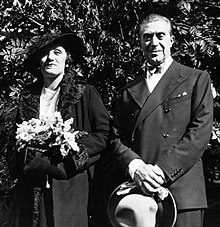Victor Francen

Victor Francen (born August 5, 1889 as Victor Charles Sidonie Franssen in Tienen , Belgium , † November 17, 1977 in Aix-en-Provence , France ) was an actor of Belgian origin in French and American films.
Live and act
Victor Charles Sidonie Franssen came from the Flemish part of Belgium, not far from the language border with Wallonia . His father was a senior police officer. At the age of 15, Franssen appeared in amateur pieces. Before he became a professional actor, he worked as an office worker. Victor Franssen made his professional stage debut in 1908 at the Théâtre royal du Parc in Brussels . He then went to France, changed its Flemish surname in a easier for French pronounceable Francen to and trained professionally at the conservatory by actor / acting coach Paul Mounet. Towards the end of the First World War , Francen established himself on Parisian stages such as the Gymnase and later also became a member of the Comédie-Française . Theater guest performances have taken him back to Brussels, but also to Russia , Canada and South America .
Victor Francen made his first contact with cinematography between 1921 and 1923 when he appeared in several silent films. But it wasn't until the age of the sound film that he appeared regularly in front of the camera. Victor Francen played heroic characters and aristocratic officers, priests and deceived husbands in a number of well-known French productions. The greatest pre-war achievement was his lead role as Commandant Bréval in the dam building and colonial drama The Man from Niger, which began in early 1940 . Since the Second World War had started shortly before , Francen in France could no longer follow up on this success. After the country was occupied by German troops, he decided to flee to the USA. There Francen continued his film career. Francen, later a US citizen, was given countless supporting roles. He took the role of the mostly dark and opaque European with a strong accent and played both Nazi villains and traitors, but also resistanceists and diplomats. Victor Francen returned to France in 1947, but was barely able to get roles in local cinema productions and instead appeared sporadically in front of the camera in foreign films. Now and then he also appeared in individual episodes of (mostly American) television series.
Francen was temporarily married to the actress Mary Marquet .
Filmography
|
|
literature
- Kay Less : The film's great personal dictionary . The actors, directors, cameramen, producers, composers, screenwriters, film architects, outfitters, costume designers, editors, sound engineers, make-up artists and special effects designers of the 20th century. Volume 3: F - H. Barry Fitzgerald - Ernst Hofbauer. Schwarzkopf & Schwarzkopf, Berlin 2001, ISBN 3-89602-340-3 , p. 75.
Web links
- Victor Francen in the Internet Movie Database (English)
Individual evidence
- ↑ is confirmed in 1889 by the American Social Security Death Index and Les gens du cinéma; older sources name the year 1888
- ^ The date of death confirmed by the death certificate Extrait de décès n ° 959/1977; other sources indicate November 18th
| personal data | |
|---|---|
| SURNAME | Francen, Victor |
| ALTERNATIVE NAMES | Franssen, Victor Charles Sidonie (maiden name) |
| BRIEF DESCRIPTION | Belgian actor in French and American films |
| DATE OF BIRTH | August 5, 1889 |
| PLACE OF BIRTH | Tienen , Belgium |
| DATE OF DEATH | 17th November 1977 |
| Place of death | Aix-en-Provence , France |